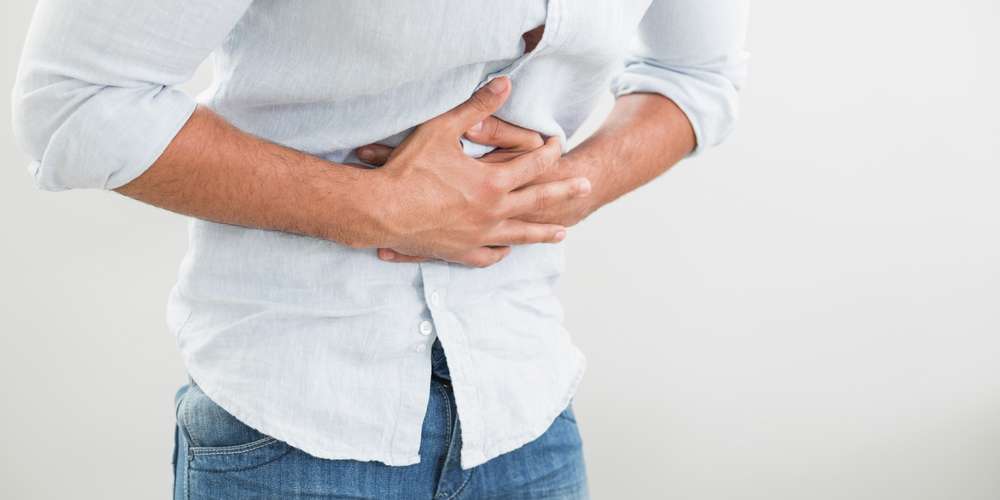COVID-19 ProtocolsLearn More
Covid-19 Safe Environment - CDC Guidelines In Place - Learn MoreBook Release Announcement - The Hernia Solution, 2nd Edition - Click here for more information
Need help? Call us 626.584.6116

The hernia symptoms listed below accompany different hernia types. Each individual will experience different hernia symptoms depending on the type of hernia and the individual’s physical health and overall wellness. Only your doctor or hernia surgeon can properly diagnose your signs and symptoms to determine whether or not they are indeed hernia related.
If you discover bulge or swelling in your abdominal area, this could be a hernia symptom. An abdominal bulge is the most common hernia symptom. When there is a hole or defect in the abdominal wall muscle, the intestinal contents bulge outwards. These intestinal contents are contained within a sac of peritoneum, referred to as the hernia sac. With strenuous activities such as lifting, straining, or coughing the bulge tends to enlarge as the intra-abdominal pressure increases. A bulge may or may not be painful, however, you should NOT ignore an abnormal bulge even if it is not painful.
Pain is a common hernia symptom . However, not all hernia patients experience pain to the same degree. Pain often occurs in an acute hernia when the muscle tissue stretches or tears. Some patients complain of a muscle ache or soreness similar to a strain, instead of a throbbing pain during the phase when the muscle stretches or ruptures. In most instances, this pain will subside in a week or two. But DO NOT ignore your hernia even though you are no longer experiencing pain. Your hernia will not simply go away, even if the pain has subsided.
Pain as a hernia symptom has been variously described as burning, tearing, sharp, dull or pulling. Some patients report that there is no pain, just a funny feeling in the groin or abdomen that was not there before. Pain occurs when tissues containing nerve endings around the hernia are stretched or torn.
A hernia can cause localized pain when the nerves in the region of the hernia become pinched or stretched. As a hernia enlarges, the surrounding nerves are further stretched resulting in more intense pain. The hernia symptom of pain tends to increase during exercise and while performing strenuous work.
A hernia symptom can also cause “referred pain” when nearby nerves are irritated and the pain travels along these nerves to other regions. This is why some patients with a hernia may complain of pain in the testicle or thigh.
A hernia causes severe pain when strangulation or incarceration occurs. Strangulation is the most serious hernia symptom. The internal abdominal organs such as the intestines become pinched resulting in a compromised blood supply. A strangulated hernia causes an abdominal pain, which initially starts as a stomachache, then increases in severity, finally causing nausea and vomiting. The strangulated tissues will die and the results can be fatal if surgery is not performed on an emergency basis.
While pain is a common hernia symptom, other non-hernia causes need to be ruled out by physical examination. In any event, it’s always in your best interest to consult a physician to determine the exact cause of your pain.
You may experience constipation as a hernia symptom if the hernia is fully or even partially blocking the intestine. This impedes the regular flow of food and consequently feces out of your body, which can trigger poisoning effect. Surgical treatment is necessary on an emergency basis when this occurs.
As previously mentioned, should the hernia become incarcerated, the regular flow of food in the intestine gets blocked creating a “back-up” inside your intestine. This can result in vomiting or nausea. Or, nausea without vomiting can occur if your intestine is only partially blocked, resulting in a loss of appetite.
It is possible for the bladder to become trapped within the hernia. When this hernia symptom occurs you may develop urinary burning, frequent infections, and urinary hesitancy or frequency. Be sure to consult your physician or urologist if you are experiencing these symptoms so they can perform an examination to determine if a hernia is present. Also, patients with a prostate problem tend to develop hernias from constant straining.